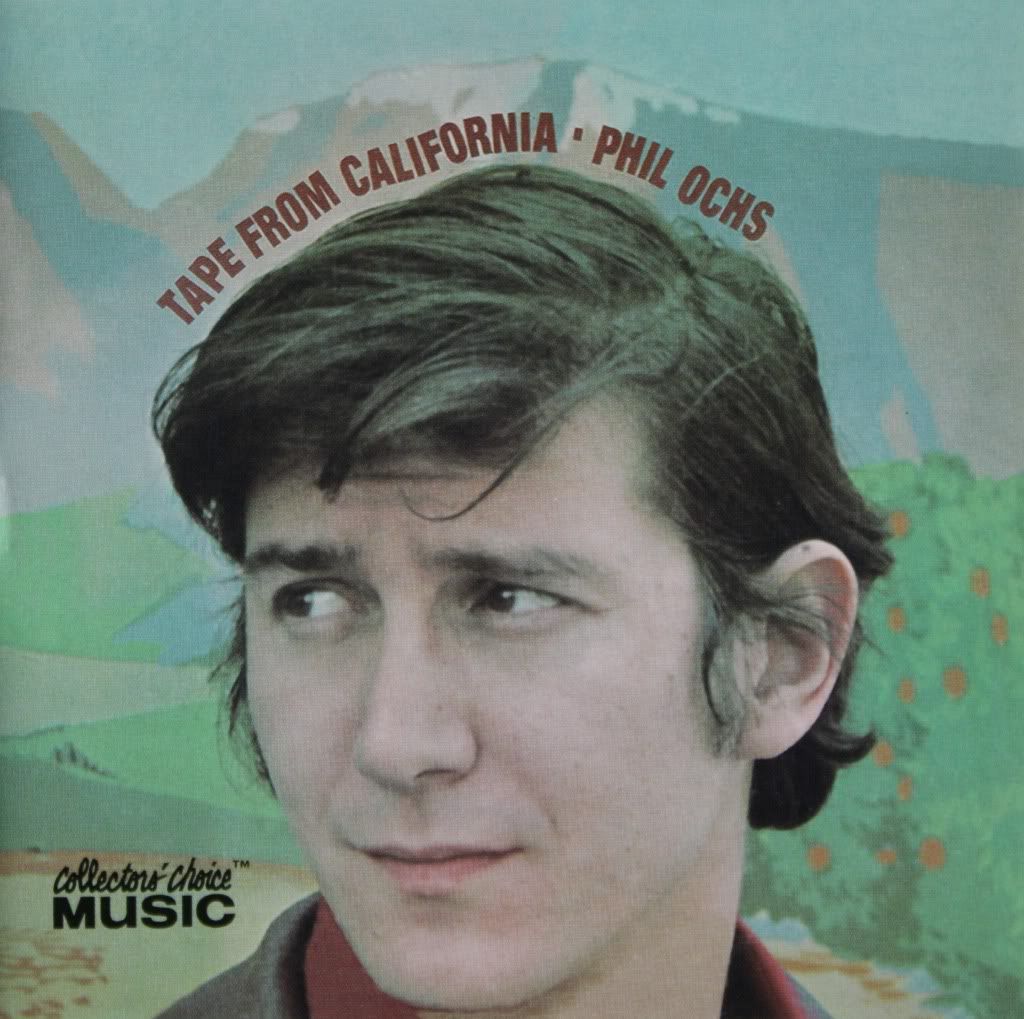The passage of time hasn't been kind to Phil Ochs' (pronounced "oaks") legacy--while at one time he was arguably second only to Bob Dylan as the most famous contemporary folk singer/songwriter in the USA, today his name (let alone his music) inspires nary a hint of recognition and his discography is in a lamentable state--few of his classic 60's releases are even available on CD and it would seem that he's on a steady path to further obscurity. It's a shame, since he's the man who competed the most fervently with Dylan when both were writing their most overt topical material and Ochs embraced the label "singing journalist" a bit more readily than Dylan. As the 60's wore on, though, Ochs was also inclined to expand his scope as a songwriter and performer, albeit in a way quite different from Dylan, with the electric, jazz and modern classical-influences of his creative high-water mark, 1967's Pleasures of the Harbor. Unfortunately Ochs' popularity failed to grow at the rate Dylan's did; a year later he produced Tape From California, wherein his talents and his frustrations seem to share the spotlight equally.
On paper, there seems to be little difference between the creative template for both albums, but under the surface lies an unprecedented tension and sense of frustration that wasn't previously evident. On Pleasures of the Harbor Ochs sounded like a master coming into his own, the earnest sanctimoniousness of his earlier albums leavened with even more sarcasm, some gallows humor and an unseen complexity and maturity as a composer and arranger, but on Tape From California he sounds like a jaded genius preparing to become a hermit after one last scathing summation of the world he's about to spurn.
His words are just as rich and opaque as they were on Harbor and the arrangements are just as lush, but it sounds as though Ochs has decided that the social change he so zealously pursued before is in fact unachievable. The album's title track, with its dual electric piano and harpsichord, reflects both disenchantment and detachment with the world as the singer continually reminds us he doesn't have time to talk, but he'll send us tape from California; Ochs' reedy voice and vibrato are just as strong as they were on Harbor, though. As the album unfolds, the melodic lines are also familiarly reminiscent of Ochs' earlier works in both their beauty and construction--the songwriter's change in direction is more subtle. The trumpets and martial drumming of "White Boots Marching in a Yellow Land," for example, reflects the doomed Vietnam conflict--try as he might to escape, it would appear that California isn't quite far enough for Ochs to escape the myriad, paradoxical ways in which his country and society have failed his hopes. We get another marching band-backed, brilliant comment on war in "The War is Over," which toys with the idea that ending war is a conscious choice. At other times the production verges on bizarre, as with "Half A Century High," on which provocative words and a chilling vision are somewhat dampened by the decision to make Ochs' vocals sound as if they're coming out of a phonograph. "The Harder They Fall," on the other hand, supports another indecipherable and at times morbid message about society's decrepit state with sweeping strings and hand drums.
The two songs that perhaps stand out the most are the two longest--the folky "Joe Hill," which borrows its melody from Woody Guthrie's "Tom Joad" and features Ramblin' Jack Elliott (who was apparently nearly too drunk to perform) on guitar. The song's something of a combination between Upton Sinclair's The Jungle and the real life story of Sacco and Vanzetti, with a protest singer twist and a murky ending. The centerpiece of the album, though, must be "When In Rome," which depicts the fall of an empire over the course of its 13 minutes with at times gruesome detail and Ochs returning sneeringly with the "When in Rome, do as the Romans do" refrain.
As Ochs' artistic impulses creep higher and higher, it's often difficult to discern just exactly what he's hoping to communicate, but what screams loudest in my ears is that all-too-personally-familiar sound of a man surrounded by all that he stands against and howling, powerless to change the situation. Though it's easy to retroactively apply his eventual suicide to his earlier work, I think it's fair to say that his frustration with his lack of large scale success in the music business also resulted in some serious bitterness toward his craft, which was focused on attempting to rally people around social change. The artistic merits of this album are pretty high; though there are a few missteps and the baroque, symphonic and jazz elements aren't as fresh and don't fit quite as comfortably as they did on Pleasures of the Harbor, it's the sense of distress and dark fragility that makes this album fascinating the way that a car accident is, rather than in a way that inspires celebration. I hold this album in pretty high regard but it's always painful to hear such a talented artist in the throes of desperation.
Though the CD is out of print, you can thankfully still get a high quality MP3 here.


1 comment:
Another fine review. I'd be interested to read your opinion of "Rehearsals For Retirement," the next nail in the coffin.
Post a Comment